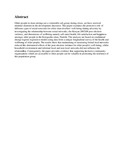| dc.description.abstract | Older people in slum settings are a vulnerable sub-group during crises, yet have received minimal attention in the development discourse. This paper examines the protective role of different types of social networks for older slum dwellers' well-being during adversity by investigating the relationship between social networks, the Kenyan 2007/08 post-election violence, and dimensions of well-being namely self-rated health, life satisfaction and happiness amongst older people in the Korogocho slum, Nairobi. The analyses are based on conditional change logistic regression models using data from a unique longitudinal survey of the health and well-being of older people. The results show that maintaining or increasing formal local networks reduced the detrimental effects of the post-election violence for older people's well-being, whilst household environment and informal local and non-local networks did not influence the relationship. Consequently, the paper provides evidence that supporting inclusive community organisations which are accessible to older people can be valuable in promoting the resilience of this population group. | en_US |

